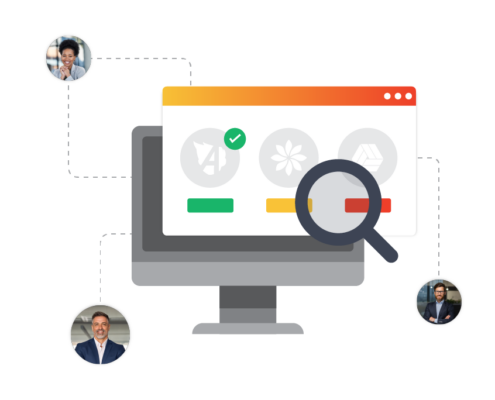

With the number of businesses in unique industries, how is it possible to generate new business leads and stand out among a sea of competitors? By integrating both business development representatives (BDRs) and sales development representatives (SDRs) into your business growth strategy, you increase the opportunity to develop new partnerships and enhance relationships with current customers.
But wait—aren’t BDRs and SDRs the same thing? In short, they’re not the same even though the terms are commonly used interchangeably. While they may have some integrating responsibilities, BDRs and SDRs have different, yet equally important, responsibilities in the grand scheme of your lead generation strategy.
Throughout this blog, we’ll cover the following topics:
BDR vs. SDR Explained
While the terms are often used interchangeably, BDR and SDR positions are very different. BDRs are responsible for finding new business opportunities or enhancing relationships with current customers. BDRs aim to generate more revenue through strategic partnerships, digital marketing efforts, and other business development activities that support growth.
SDRs, on the other hand, identify and engage with prospects in the target market to pitch a company’s product or service. Sales development representatives prospect and bring qualified leads into the sales pipeline. Through the sales pipeline, they continuously work to convert leads into long-term customers.
Why We Shouldn’t Confuse BDRs and SDRs
Confusing BDRs and SDRs can be troublesome because intertwining job descriptions could result in unfocused market penetration, unpredictable sales cycles, inaccurate revenue forecasts, and fluctuating processes. Making a clear distinction between BDRs and SDRs allows businesses to understand which sales processes may need to be adjusted.
Learn More: Why Should Your SDRs Be BDRs First?
Business Development Representative (BDR) Role Description
A BDR’s main goal is to identify business opportunities and generate leads. This position is more creative than the SDR role because they spend their day brainstorming new ideas for lead development.
BDRs discover leads through various channels, including search engines, social media, networking, cold calling, or emails. They help set sales development reps up for success by building relationships with potential customers and effectively turning cold leads into warm ones.
Many companies also refer to their BDRs as account executives, strategic partnership managers, strategic alliance specialists, and solutions consultants to help recruit high-performing sales professionals.
Sales Development Representative (SDR) Role Description
SDRs manage the existing leads that the BDRs discover. Sales development reps nurture leads through various platforms, including emails, newsletters, and social media platforms. Leads may also be generated from colleagues or customer referrals.
Depending on the structure of the sales department, BDRs are typically responsible for gathering the leads. Then, SDRs take those leads and determine which ones would yield the biggest ROI. From there, they contact qualified leads to help the company close business.
SDRs practice “lead scoring,” which is when they rate each prospect to determine how ready they are to make a purchase. Each company or sales rep may have their approach to the lead scoring process, but there are some actions that they must follow to score a lead productively. Lead scoring determines how quickly an SDR should act on a lead: the higher the lead score, the more ready they are to make a sale. Therefore, an SDR should be considerate and realistic when scoring a lead to make sure they’re a good fit for your company.
Sales development reps are responsible for engaging with prospects, nurturing relationships, and closing sales. They are also often referred to sales associates, account executives, and sales consultants to attract candidates with the most advanced sales experience.
Want to build an SDR team that crushes quotas and books more meetings? Download our free guide to get the inside scoop on everything from hiring top talent to creating strategies that drive real results.
In-House vs. Outsourced BDR and SDR Teams
Every company has a different goal when it comes to its business growth strategy. It’s essential to consider your strategy when deciding whether to internalize or outsource your sales and marketing efforts.
Internal BDR and SDR teams are great if you have the tools, technology, money, and expertise to acquire and continuously train a high-performing sales team. Many small to medium-sized businesses don’t have the capability to efficiently internalize BDRs and SDRs, which is why many choose to outsource their efforts.
Internal lead generation teams are ideal if you want a 360-degree view of your reps at all hours of the workday. A downfall of outsourcing BDRs and SDRs is that you don’t have real-time visibility of reps, so you don’t have the opportunity to coach and adjust the pitches as they’re making them. However, an outsourced BDR and SDR team with no visibility is a red flag. Outsourced BDR and SDR teams should schedule a monthly review of the results with you to listen to each pitch, make adjustments and suggestions as needed, and discuss high-converting opportunities that are on the horizon.
Benefits of Outsourcing a BDR and SDR Team
While internal teams may have their perks, outsourced BDR and SDR teams also have many advantages that internal teams cannot provide.
- Generate new opportunities: Outsourced BDR and SDR teams give you access to new regions and markets. They can adjust their pitch to be used in different markets and introduce new products or services to the industry. This is a great way to gather market research and learn how they react to the new product or service.
- Fill the sales pipeline with better leads: Outsourcing sales development efforts allows BDRs and SDRs to generate better leads. They work with your internal team to identify your business’s lead qualifiers and apply them to their development process.
- Better conversion rates: Since BDRs and SDRs are generating better leads, they’re more likely to close business deals with prospects that have a need. This increases the opportunity to convert leads into long-term customers.
- Boost customer satisfaction and retention: Outsourcing allows you to free up your internal team’s time to prioritize relationships with current customers. This supports a better long-term customer experience.
- Access to sales expertise: Outsourcing BDRs and SDRs means instantly gaining expertise in sales and business development. Lead generation providers hire BDRs and SDRs specializing in sales and business development and typically have many years of experience. Outsourced lead generation experts apply their knowledge to your business from day one of the partnership.
- Minimal training time: Outsourcing your BDR and SDR team empowers you to minimize your internal team’s training time. You don’t have to take the time to teach them the process your company follows because the outsourced company has a method they follow. This gives you more time to focus on your day-to-day operations.
- Provides flexibility: Changing an internal BDR and SDR program is costly and can take up a lot of time internally. Outsourcing provides flexibility to make changes without affecting your budget or daily operations.
Key Takeaways
At Abstrakt Marketing Group, we provide our clients a hybrid role that accomplishes both BDR and SDR responsibilities.
Our SDRs set sales appointments with prospects that meet our clients’ unique, predetermined criteria. For example, some clients only want to work with particular industries. On the other hand, some clients only want to work with buildings with specific square footage to ensure a significant business opportunity.
For the Abstrakt sales pipeline, we separate BDR and SDR tasks into their specialized roles. They create a sustainable sales pipeline and close business opportunities. They take additional sales measures such as Live Transfers and Zoom Connects to ensure that an opportunity doesn’t fall through the cracks. These sales meeting tactics are beneficial because they directly connect a prospect with a certified sales representative.
Ready to take your business growth to the next level? Contact us today to learn how our SDRs can help you generate new business opportunities!




